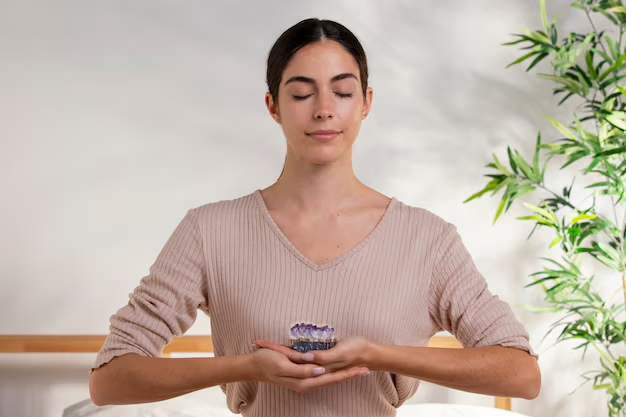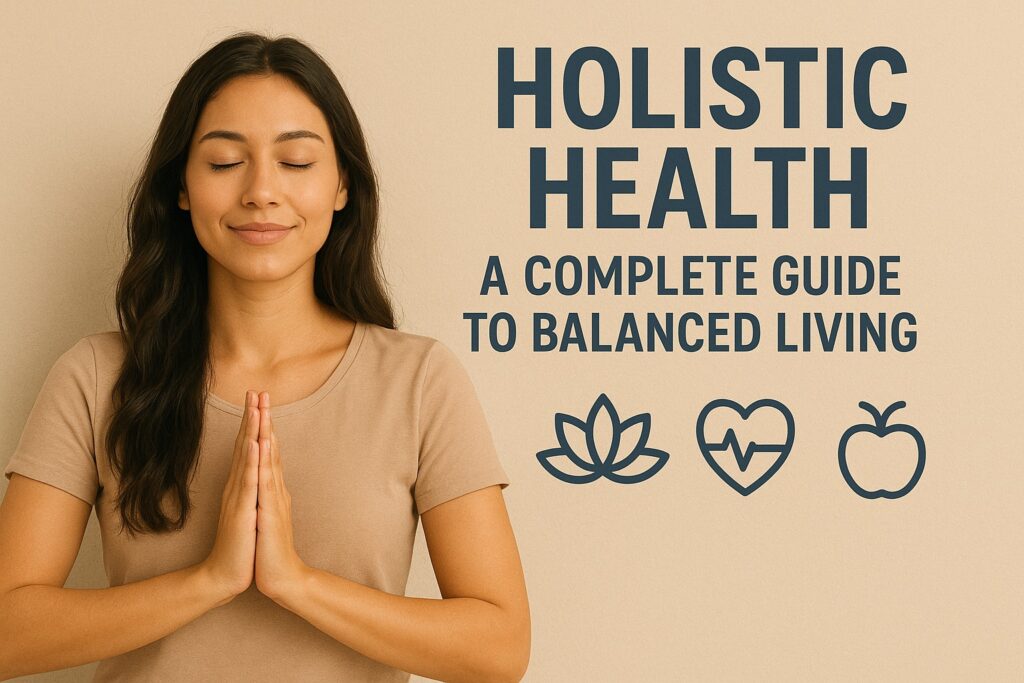Holistic health is a way of living that looks at the entire person — body, mind, spirit, and emotions — instead of just treating specific illnesses or symptoms. It encourages a more complete view of well-being, where all parts of a person are seen as connected and important for overall health.
The term “holistic” comes from the Greek word holos, meaning “whole.” This approach believes that true health is more than just the absence of disease. It’s about finding balance and harmony in every area of life, from physical fitness to emotional peace and mental clarity.
Holistic health focuses on prevention, personal responsibility, and mindful living. It encourages people to live in a way that supports their full well-being, considering how lifestyle, environment, relationships, and beliefs affect health. When body, mind, and spirit work together in balance, a person is believed to achieve a deeper, more lasting sense of wellness.
The Pillars of Holistic Health
To understand holistic health, we must examine its core pillars:

Physical Health: In the context of holistic health, physical well-being refers to the overall care and functioning of the body. It includes maintaining proper nutrition, engaging in regular physical exercise, ensuring restorative sleep, and receiving routine medical evaluations to support optimal bodily function.
Emotional Health: Holistic health emphasizes emotional stability as a key component of wellness. This involves the ability to effectively process and manage emotions, maintain psychological balance, and develop strong interpersonal connections that help navigate life’s emotional challenges.
Mental Health: Within holistic health, mental well-being is seen as essential. It encompasses the mind’s capacity to concentrate, learn, solve problems, and remain mentally resilient when faced with stress or cognitive demands.
Spiritual Health: Spiritual health, a core aspect of holistic health, relates to an individual’s sense of meaning, personal values, and purpose in life. It includes feeling connected to oneself, to others, to nature, or to a higher presence, whether religious or not.
Social Health: Holistic health recognizes the importance of meaningful social interactions. Strong personal relationships, a sense of community, and social support are crucial to emotional and psychological stability and long-term health.
Environmental Health: Environmental well-being is vital in holistic health. It considers the impact of one’s living and working environments, including exposure to clean air, safe water, noise levels, and general cleanliness, all of which influence physical and mental wellness.
Why Choose a Holistic Approach ?
Traditional medicine often treats symptoms, not root causes. Holistic health digs deeper by:
Addressing the underlying causes rather than simply treating surface-level symptoms is a key principle of holistic health, aiming for lasting wellness instead of temporary relief.
Promoting disease prevention through healthy lifestyle choices and balanced nutrition reflects the proactive nature of holistic health in maintaining long-term well-being.
Encouraging individuals to actively participate in their own care is central to holistic health, fostering self-awareness, responsibility, and empowerment in health decisions.
Enhancing overall quality of life by creating harmony in all areas of living, rather than enforcing strict limitations, captures the balanced and sustainable approach of holistic health.
Top Tips for Achieving Holistic Health
Let’s break down the best, science-backed and time-tested tips you can adopt to live a more holistic, balanced life:
Adopt a “Circadian Rhythm” Lifestyle

Syncing your daily routine with your body’s natural clock, also known as the circadian rhythm, is a powerful way to support your well-being. This internal clock controls your sleep-wake cycle, hunger, energy levels, and more. By aligning your habits with it, you help your body function at its best.
In holistic health, this balance is essential. Going to bed and waking up at the same time each day, eating meals regularly, and getting sunlight in the morning can all help regulate your rhythm. These practices promote better sleep, improved digestion, and mental clarity.
Holistic health views your body as a connected system. When your daily routine flows naturally with your body’s rhythm, it supports your physical, emotional, and mental wellness. Instead of fighting fatigue or stress, you work with your body to feel more energized, focused, and in harmony with yourself.
Eat, sleep, and exercise at consistent times
Get morning sunlight within the first hour of waking
Dim lights 2 hours before bedtime
🌅 Tip: Aligning with your circadian rhythm improves sleep, hormones, and mental clarity.
Practice Somatic Healing Techniques
Somatic healing techniques focus on the connection between the mind and body to help release stored tension, stress, and trauma. These methods include practices like deep breathing, body scanning, gentle movement, and touch-based therapies. They help you become more aware of physical sensations and emotions.
In holistic health, somatic healing plays a key role in promoting emotional and physical balance. It encourages people to listen to their bodies, respond to discomfort, and gently process unresolved stress. This supports the body’s natural ability to heal and restore inner calm.
By practicing somatic techniques regularly, you can improve your overall sense of well-being. These methods are especially helpful for managing anxiety, chronic pain, and emotional overwhelm. Holistic health recognizes that healing happens through the mind-body connection, and somatic work is a gentle and powerful way to support both.
Try body scans, breathwork, or TRE (tension & trauma release exercises)
Notice where tension or emotion lives in your body
Use gentle movement to release it
🌀 Tip: Healing emotions somatically can resolve chronic physical symptoms.
Create a “Digital Diet”

Creating a “digital diet” means setting healthy limits on screen time to improve mental, emotional, and physical well-being. Constant exposure to phones, computers, and social media can lead to stress, poor sleep, and reduced focus. A digital diet encourages mindful use of technology throughout the day.
In holistic health, balance is key. Limiting screen time, especially before bed, helps reset your body’s natural rhythms and supports better sleep. Taking regular breaks from devices also reduces eye strain, improves posture, and allows more time for real-life connections and self-care.
Practicing a digital diet supports holistic health by creating space for rest, creativity, and presence. Simple steps like turning off notifications, setting screen-free hours, or replacing phone time with nature walks can make a big difference. It’s about using technology in a way that supports your whole self—body, mind, and spirit.
Limit negative news exposure
Follow accounts that inspire peace and growth
Schedule “screen fasting” times
📱 Tip: Your digital consumption affects your mental and emotional diet.
Keep a “Mood + Energy Journal”
Keeping a “Mood + Energy Journal” is a simple but powerful tool to track how your emotions and energy levels shift throughout the day. By writing down how you feel at different times, you can begin to notice patterns linked to sleep, food, activities, or interactions.
In holistic health, awareness is the first step toward balance. A journal helps you connect the dots between your daily choices and your mental, emotional, and physical states. For example, you might discover that certain foods drain your energy, or that you feel more positive after exercise or quiet time.
Using a Mood + Energy Journal supports holistic health by encouraging self-reflection and mindfulness. Over time, it becomes easier to make choices that support your well-being. This practice helps you tune into your body’s needs and make adjustments that lead to a more balanced and healthy lifestyle.
Log meals, activities, moods, and sleep
Spot patterns that drain or energize you
Adjust accordingly
📓 Tip: Self-tracking builds self-awareness — the first step to transformation.

Make Time for Creative Expression
Making time for creative expression is an important part of nurturing your overall well-being. Whether it’s painting, writing, dancing, or playing music, creative activities help release emotions, reduce stress, and bring joy. They allow you to express thoughts and feelings that may be hard to put into words.
In holistic health, creativity is more than just a hobby — it’s a healing tool. Expressing yourself in creative ways supports emotional balance, encourages mindfulness, and strengthens the connection between mind and body. It can also improve focus and boost your sense of purpose.
Adding creative time to your routine helps support holistic health by bringing more harmony into your life. It allows you to step away from daily pressures and reconnect with yourself. Even small moments of creative play can have a big impact on your mood, energy, and overall sense of wellness.
Creativity is therapy for the soul:
Paint, write, dance, cook, garden — whatever brings joy
Let go of outcomes and perfection
Make it regular, not rare
🎨 Tip: Creative expression unlocks flow states and emotional release.
Spend Time in “Silence Retreats” — Even Short Ones
Spending time in “silence retreats,” even for a short period, can bring deep peace and clarity. A silence retreat means stepping away from noise, distractions, and constant communication to sit quietly with your thoughts. It helps calm the mind and allows space for self-reflection.
In holistic health, silence is seen as a way to reconnect with your inner self. Even a few minutes of intentional quiet each day can reduce stress, improve focus, and promote emotional balance. It’s not about isolation but creating a still space where your body and mind can reset.
Short silence retreats, whether a quiet morning walk or 15 minutes without screens, support holistic health by restoring inner calm. This practice helps you listen to your thoughts, connect with your breath, and become more present. Over time, these moments of silence can bring more peace, awareness, and balance into your life.
Silence fosters clarity:
Take 1 hour a day or 1 day a week without talking or digital input

Use the time to reflect, meditate, or just be
Allow your thoughts to settle
🤫 Tip: Silence helps you hear what your intuition is trying to say.
Connect with Nature
Nature therapy, also known as ecotherapy, is the practice of spending time in natural surroundings to support mental and emotional well-being. Whether it’s a walk in the park, gardening, or sitting by a tree, these simple activities can reduce stress and bring a sense of calm.
In holistic health, connecting with nature is seen as a powerful way to restore balance. Nature therapy has been shown to lower cortisol levels — the hormone linked to stress — and improve mood. Time outdoors can also help clear the mind, increase energy, and enhance overall emotional health.
Regular exposure to nature supports holistic health by promoting peace, presence, and relaxation. Even a few minutes a day in a green space can make a difference. This gentle, natural practice reminds us to slow down, breathe deeply, and reconnect with the world around us for better health and harmony.
Walk barefoot on grass (earthing)
Spend time in forests, gardens, or parks
Listen to natural sounds like birdsong or ocean waves
🌳 Tip: Try forest bathing (Shinrin-yoku) — a Japanese practice of mindfully walking in nature.
Nourish Your Body with Whole Foods
Nourishing your body with whole foods means choosing natural, unprocessed foods that support your body’s true needs. These include fresh fruits, vegetables, whole grains, nuts, seeds, and healthy fats. Whole foods provide essential nutrients that help your body stay strong, energized, and balanced.
In holistic health, food is seen as a form of medicine. Eating clean, whole foods supports digestion, boosts immunity, and improves mental clarity. It also helps reduce inflammation and maintain a healthy weight. Choosing foods that come from nature, rather than a factory, supports your body’s natural healing processes.
Making small changes, like cooking at home or adding more colorful vegetables to your meals, can greatly improve your well-being. Holistic health encourages mindful eating, where you listen to your body’s signals and give it what it truly needs to feel nourished, strong, and in harmony.

Avoid ultra-processed foods and instead choose:
Leafy greens and colorful vegetables
Whole grains like quinoa, oats, and brown rice
Healthy fats from avocados, nuts, and seeds
Lean proteins such as legumes, fish, and organic poultry
🥗 Tip: Follow the 80/20 rule — 80% whole, unprocessed food; 20% indulgence in moderation.
Stay Physically Active Daily
Movement is medicine for the body and mind. You don’t have to run marathons or do intense workouts to stay healthy. Simple activities like walking, stretching, dancing, or yoga can make a big difference. The goal is to keep your body moving in a way that feels natural and enjoyable.
In holistic health, regular movement is seen as a vital part of overall well-being. Physical activity helps improve circulation, reduce stress, boost energy, and support emotional balance. It also keeps your muscles, joints, and heart strong while helping you feel more connected to your body.
Making time for gentle daily movement supports holistic health by creating balance between effort and rest. Even short walks or light stretching can improve your mood and focus. The key is consistency and choosing activities that you enjoy. Movement should feel like care for your body, not punishment or pressure.
Walk 10,000 steps a day
Stretch and do yoga
Try strength training twice a week
🧘♂️ Tip: 30 minutes of moderate activity daily improves mood, immunity, and sleep.
Cultivate Positive Relationships

Strong social ties are closely linked to a longer, healthier life. Positive relationships with family, friends, and community members offer emotional support, reduce stress, and bring a sense of belonging. Feeling connected to others helps you feel valued and understood.
In holistic health, social well-being is just as important as physical or mental health. Supportive relationships can improve mood, boost the immune system, and even lower the risk of chronic illness. Whether through a heartfelt conversation, shared laughter, or simply spending time together, social connection plays a powerful role in overall wellness.
Making time to build and maintain relationships supports holistic health by nurturing emotional balance and resilience. Even small efforts, like checking in on a friend or joining a community group, can strengthen your support system. In the journey toward well-being, staying socially connected is a key part of living a happy, healthy, and meaningful life.
Connect with friends regularly
Avoid toxic relationships
Join groups, clubs, or volunteer
🫶 Tip: Quality matters more than quantity in friendships.
Detox Your Mind
Mental clutter can be just as harmful as physical clutter. When your mind is filled with too many thoughts, worries, or distractions, it becomes harder to focus, make decisions, or feel at peace. Just like a messy room, a cluttered mind can lead to stress and overwhelm.
In holistic health, mental clarity is essential for overall well-being. Taking time to clear your thoughts—through journaling, meditation, or simply quiet moments—helps you feel more balanced and centered. A clear mind allows space for creativity, better choices, and emotional calm.
Letting go of mental clutter supports holistic health by creating a peaceful inner environment. Reducing information overload, setting boundaries, and staying organized mentally can improve both emotional and physical health. Just as you clean your surroundings, caring for your mental space helps you feel lighter, more focused, and better able to enjoy daily life.
Practice cognitive decluttering
Replace negative thoughts with affirmations
Meditate or pray
🧠 Tip: What you feed your mind shapes your world.

Conclusion
Holistic health is about caring for the whole person — body, mind, emotions, and spirit — rather than focusing on just one part. It encourages a balanced lifestyle that supports physical wellness, emotional strength, mental clarity, and spiritual peace. By choosing natural foods, staying active, connecting with others, and finding quiet time for yourself, you can improve your overall well-being in a lasting way.
Small daily habits like spending time in nature, keeping a journal, or limiting screen time can make a big difference. These simple practices help bring awareness, calm, and energy into your life. Holistic health reminds us that true wellness comes from within and grows through conscious choices.
In today’s busy world, taking a holistic approach helps you stay grounded, healthy, and in tune with yourself. It is not about being perfect, but about creating harmony in all areas of life and feeling well from the inside out.
FAQs
- What is holistic health ?
Holistic health is an approach to wellness that focuses on the whole person — body, mind, emotions, and spirit — rather than just treating symptoms or illnesses. - How is holistic health different from traditional medicine ?
While traditional medicine often treats specific conditions, holistic health aims to find the root cause and improve overall balance and well-being through lifestyle changes, prevention, and natural methods. - Can holistic health practices be used alongside regular medical care ?
Yes, holistic health can work together with conventional medicine to support healing and improve quality of life. It’s best to consult with both healthcare and holistic professionals. - What are common holistic health practices ?
Common practices include healthy eating, physical movement, meditation, journaling, nature therapy, and creative expression to support overall wellness. - Is holistic health suitable for everyone ?
Yes, holistic health is for people of all ages and lifestyles. It encourages personal responsibility and small daily habits to support long-term well-being.
